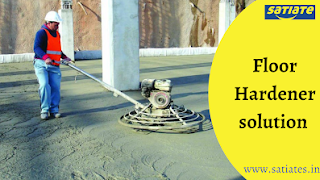Strengthening Your Flooring with Floor Hardner: The Benefits and Advantages
Floor hardener is a material used to enhance the durability and strength of concrete floors. This solution is particularly useful for high-traffic areas, such as commercial and industrial spaces, where the flooring is subjected to heavy loads and constant wear and tear. The primary purpose of floor hardener is to increase the resistance of concrete to abrasions, impacts, and wear, thus prolonging its lifespan and improving its overall performance.
Floor hardener is available in various forms, including liquid, powder, and pre-cast concrete elements. The most common form of floor hardener is a dry powder that is sprinkled onto the freshly laid concrete floor and then spread evenly using a steel trowel. This dry powder can be made from different materials, including steel fibers, iron oxide, and quartz aggregates. Once the powder is spread, it is then wetted with water, which causes a chemical reaction that binds the particles together, resulting in a dense and hard layer.
One of the biggest advantages of floor hardener is its versatility. It can be used in a wide range of applications, from industrial and commercial flooring to residential and public spaces. Floor hardner is especially suitable for high-traffic areas, such as warehouses, factories, and shopping centers, where the floor is subjected to constant wear and tear. It is also ideal for use in areas where heavy equipment is used, such as automobile workshops and garages, where the floor is subjected to high impacts and abrasions.
Another advantage of floor hardener is its durability. Unlike traditional concrete flooring, floor hardener is much more resistant to wear and tear, making it ideal for high-traffic areas. Floor hardener is also resistant to impact, meaning that it can withstand the weight of heavy equipment and machinery, making it ideal for industrial and commercial spaces. Additionally, floor hardener is resistant to abrasion, meaning that it can withstand the constant wear and tear that occurs in high-traffic areas, such as shopping centers and warehouses.
Another advantage of floor hardener is its low maintenance requirements. Unlike other flooring solutions, such as carpeting or vinyl, floor hardener does not require any special maintenance or cleaning. The dense and hard layer of floor hardener is easy to clean and maintain, making it ideal for high-traffic areas where frequent cleaning is necessary. Additionally, floor hardener is resistant to staining, meaning that it can be used in areas where food and drinks are served, without the risk of unsightly staining.
Floor hardener is also cost-effective. Compared to other flooring solutions, floor hardener is relatively inexpensive, making it ideal for commercial and industrial spaces where cost is a concern. Additionally, floor hardener is long-lasting, meaning that it does not need to be replaced as frequently as other flooring solutions, making it a cost-effective option in the long term.
Finally, floor hardener is environmentally friendly. Unlike traditional flooring solutions, such as carpeting or vinyl, floor hardener is made from natural materials, such as steel fibers and iron oxide, meaning that it is not harmful to the environment. Additionally, floor hardener is recyclable, making it an environmentally friendly option in the long term.
In conclusion, floor hardener is a versatile, durable, low-maintenance, cost-effective, and environmentally friendly flooring solution that is ideal for high-traffic areas. Whether you are looking to enhance the durability of your commercial or industrial space or simply want to improve the longevity of your concrete floor, floor hardener is the perfect solution. So why not consider using floor hardener for your next flooring project?
For more information,
Call us: +91 9960602620
Or Visit: https://www.satiates.in/sika-chapdur-floor-hardner.php


Comments
Post a Comment